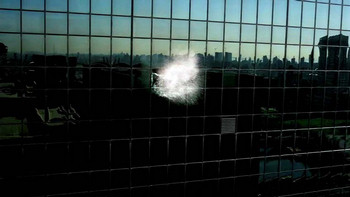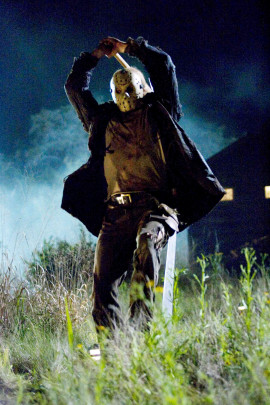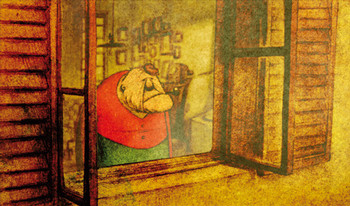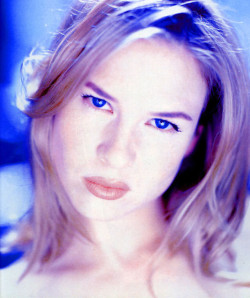A New Beginning for Opening Shots?
 It appears that Scanners’ Jim Emerson has a renewed interest in his fantastic Opening Shots Project, after a hiatus of more than a year for the series.
It appears that Scanners’ Jim Emerson has a renewed interest in his fantastic Opening Shots Project, after a hiatus of more than a year for the series.
 It appears that Scanners’ Jim Emerson has a renewed interest in his fantastic Opening Shots Project, after a hiatus of more than a year for the series.
It appears that Scanners’ Jim Emerson has a renewed interest in his fantastic Opening Shots Project, after a hiatus of more than a year for the series.
 On the 1996 benefit album Sweet Relief II: The Gravity of the Situation, the songs of Vic Chesnutt were covered by everybody from Madonna to R.E.M. to the Smashing Pumpkins to the Indigo Girls. Early in his career, the singer/songwriter was championed by Michael Stipe, who produced Chesnutt’s first two records, released in 1990 and 1991. PBS aired a documentary titled Speed Racer about his life. He had a small part in Sling Blade. He has collaborated with a diverse slate of artists from Widespread Panic to jazz guitarist Bill Frisell to the Cowboy Junkies to members of Fugazi and Godspeed You! Black Emperor. Chesnutt’s latest partnership is with the psychedelic-pop group Elf Power, part of the Georgia collective that spawned The Apples in Stereo and Neutral Milk Hotel. Chesnutt and Elf Power will be among the performers at a March 18 R.E.M. tribute concert at Carnegie Hall, at which they’ll perform “Everybody Hurts.” I start with the résumé because even if you’ve heard Chesnutt’s name, he’s not exactly famous. He has an immense reputation but a relatively small audience.
On the 1996 benefit album Sweet Relief II: The Gravity of the Situation, the songs of Vic Chesnutt were covered by everybody from Madonna to R.E.M. to the Smashing Pumpkins to the Indigo Girls. Early in his career, the singer/songwriter was championed by Michael Stipe, who produced Chesnutt’s first two records, released in 1990 and 1991. PBS aired a documentary titled Speed Racer about his life. He had a small part in Sling Blade. He has collaborated with a diverse slate of artists from Widespread Panic to jazz guitarist Bill Frisell to the Cowboy Junkies to members of Fugazi and Godspeed You! Black Emperor. Chesnutt’s latest partnership is with the psychedelic-pop group Elf Power, part of the Georgia collective that spawned The Apples in Stereo and Neutral Milk Hotel. Chesnutt and Elf Power will be among the performers at a March 18 R.E.M. tribute concert at Carnegie Hall, at which they’ll perform “Everybody Hurts.” I start with the résumé because even if you’ve heard Chesnutt’s name, he’s not exactly famous. He has an immense reputation but a relatively small audience.
 What could possible explain Friday the 13th’s $43.6-million holiday-weekend take? Let’s be honest: The first one sucked – yes, I have seen it as an adult – and the movies didn’t exactly improve as the franchise progressed. The series proper (1980’s first installment through 2002’s Jason in Space [I know, I know]) has gotten less popular as it’s gone on, with its domestic gross shrinking in spite of inflation. I’m generally not bothered by remakes/reboots/re-imaginings, and I certainly believe fresh eyes and contexts can find new uses for recycled material. But Friday the 13th was a threadbare knock-off of a movie that skated by (quite well, admittedly) on technique over originality.
What could possible explain Friday the 13th’s $43.6-million holiday-weekend take? Let’s be honest: The first one sucked – yes, I have seen it as an adult – and the movies didn’t exactly improve as the franchise progressed. The series proper (1980’s first installment through 2002’s Jason in Space [I know, I know]) has gotten less popular as it’s gone on, with its domestic gross shrinking in spite of inflation. I’m generally not bothered by remakes/reboots/re-imaginings, and I certainly believe fresh eyes and contexts can find new uses for recycled material. But Friday the 13th was a threadbare knock-off of a movie that skated by (quite well, admittedly) on technique over originality.
‘Battlestar Galactica S1’ – After the brisk miniseries, this was a long haul with an admittedly superior cliffhanger. Tigh must die — now.
‘Encounters at the End of the World’ – By turns tedious and fascinating, Herzog’s doc resembles the doomed penguin walking to the mountains.
‘Zodiac’ – Subtly but thoroughly subversive and odd, Fincher’s procedural is radical in construction but goes down easily. A quiet triumph.
 I’ll start with an admonition: You have no reason not to have a horse in the short-film categories for the Oscars. These should be your favorite races, because they require relatively small investments of time. If you see and hate The Reader, you’ve lost 124 minutes of your life. If you see and hate Lavatory – Lovestory, you’re out 10 minutes. And the chances of you hating Lavatory – Lovestory are much smaller. Alas, each has about the same chance of winning the top prize in its category.
I’ll start with an admonition: You have no reason not to have a horse in the short-film categories for the Oscars. These should be your favorite races, because they require relatively small investments of time. If you see and hate The Reader, you’ve lost 124 minutes of your life. If you see and hate Lavatory – Lovestory, you’re out 10 minutes. And the chances of you hating Lavatory – Lovestory are much smaller. Alas, each has about the same chance of winning the top prize in its category.
‘The Strangers’ – Expert, brutal, pointless, and a good student of its elders. 77 minutes, and 70 pass before the creeps commit bodily harm.
 Rotten Tomatoes has a feature called “Average Tomatometer by Year,” and the default screen for Renée Zellweger looks grim. From 2005 to 2009, her score drops for two years (from 80 to 52), recovers a little (to 64), and falls off a cliff (to 19). This is completely meaningless, of course. If you expand the time frame, the line jumps up and down mercilessly. If you’ve ever heard of the trouble with a “small sample size,” this is prime evidence, with most actors being in one or two movies a year. And Renée is but one person in movies containing (and made by) multitudes. Still, there’s the sneaking suspicion that Ms. Zellweger is on a downward trajectory.
Rotten Tomatoes has a feature called “Average Tomatometer by Year,” and the default screen for Renée Zellweger looks grim. From 2005 to 2009, her score drops for two years (from 80 to 52), recovers a little (to 64), and falls off a cliff (to 19). This is completely meaningless, of course. If you expand the time frame, the line jumps up and down mercilessly. If you’ve ever heard of the trouble with a “small sample size,” this is prime evidence, with most actors being in one or two movies a year. And Renée is but one person in movies containing (and made by) multitudes. Still, there’s the sneaking suspicion that Ms. Zellweger is on a downward trajectory.
‘Planet Terror’ – Not nearly bad enough to be a true homage; despite the charming scratches etc., it’s far too polished and winking to work.